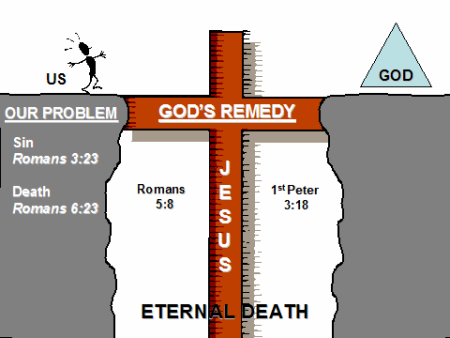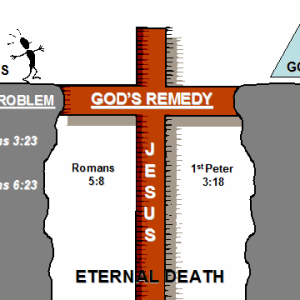I. The Predestination Railroad
When St. Paul describes Jesus as the “one Mediator” between God and man, he’s referring to the bridge built by Christ over this chasm.
To expand on this metaphor, one way to think of predestination is a train on railroad tracks. It does not, and it cannot, arrive at any destination other than the one at the other end of the tracks: in this case, Heaven. The journey is much too far for us to make on our own, and besides that, it contains the impassible gulf of sin. Our Mediator, Christ, has made Himself the Bridge, and so for anyone to arrive on the other side, they must go through Him (John 14:6). The Predestination Train goes over the Bridge, and in fact, there’s no other way over the Bridge. If you’ve ever seen a train bridge, you know what I mean: you’d kill yourself trying to cross it on your own.
What Catholics acknowledge, in addition to the above, is that we’re free to hop off the train if we want to. We agree with our Protestant brethren that it’d be stupid (again, watch a train cross a train bridge, and think of how painful it’d be to jump off). We just know that some folks do it. This understanding, I think, makes Paul’s stuff on predestination make sense with the rest of his own theology, and with the rest of the Bible, as well as with Sacred Tradition.
When Paul writes, “For those God foreknew He also predestined to be conformed to the likeness of His Son, that He might be the firstborn among many brothers. And those He predestined, He also called; those He called, He also justified; those He justified, He also glorified,” in Romans 8:29-30, it’s like someone reading the stops on a train schedule: “well, we left the station with predestination, we’ve gone past calling and justification, and here we are headed to glorification.” It’s one continual process, and it’s a continual process made possible only with Christ.
But some people will decide to do something hare-brained, like hop off the train to go chase some attractive woman, or another god, or perhaps wealth, or they’ll just despair that the train really is going where it says it’s going, since sometimes the ride’s a bit bumpy.
II. Falling From Grace
We know for a fact that this occurs, because Paul tells us so in Galatians 5:4, about how some will fall from Grace, right after warning in Gal 5:1, “It is for freedom that Christ has set us free. Stand firm, then, and do not let yourselves be burdened again by a yoke of slavery.” So those once freed can be re-enslaved.
The most gripping passage on the subject is Hebrews 6:4-6, which says:
It is impossible for those who have once been enlightened, who have tasted the heavenly gift, who have shared in the Holy Spirit, who have tasted the goodness of the word of God and the powers of the coming age, if they fall away, to be brought back to repentance, because to their loss they are crucifying the Son of God all over again and subjecting Him to public disgrace.
An early heresy (Novatianism) understood this to literally mean that even if they repented, it was no good. That’s not the correct interpretation. Almost certainly, the individuals in question are those returning to Judaism, not only rejecting Christ, but taking the position that it was right that He was Crucified. The author of Hebrews is explaining that these sort of “post-Christians” are nearly impossible to bring back to Christianity. It’s much easier to bring Christianity to those who’ve never had it than to those who’ve had it and rejected it.
But frankly, whether you take the Catholic or Novatian interpretation, both are premised off of the fact that you can fall away. Why? Because the author of Hebrews says so. The OSAS alternative is the absurd claim that this is a false hypothetical. [As an aside, note also the recourse to the sacraments: “once been enlightened” (Baptism), “who have tasted the heavenly gift” (Eucharist), and “who have shared in the Holy Spirit” (Confirmation). I read that interpretation on an Orthodox website, and I’d never noticed it! Turns out that what these “post-Christians” really need is a fourth Sacrament, Reconciliation.]
The author of Hebrews continues in Hebrews 6:7-8,
Land that drinks in the rain often falling on it and that produces a crop useful to those for whom it is farmed receives the blessing of God. But land that produces thorns and thistles is worthless and is in danger of being cursed. In the end it will be burned.
Of course, this land isn’t hypothetical. And note also that it the distinction isn’t whether it drinks in the rain (Grace), but how it responds to the rain. Whether it bears crops or thorns. This, of course, brings the issue from earlier (the importance of works of charity in maintaining one’s salvation) back into the picture. If we use the talents God gives us for uncharitable purposes (or no purpose at all), we are “in danger of” being cursed. It’s interesting that there’s still hope, only the risk of the curse: no eternal and unflinching predestination to Hell, as the double-predestination crowd hopes for.
And what of the audience to which Hebrews is addressed? Hebrews 6:9-12 continues:
Even though we speak like this, dear friends, we are confident of better things in your case—things that accompany salvation. God is not unjust; He will not forget your work and the love you have shown Him as you have helped his people and continue to help them. We want each of you to show this same diligence to the very end, in order to make your hope sure. We do not want you to become lazy, but to imitate those who through faith and patience inherit what has been promised.
So they’re onboard the Predestination Train, headed for the “things that accompany salvation,” with the promises of God blessing them for their (a) work, and (b) love shown to God in serving our neighbors. But he still cautions them not to become lazy, but to keep on this same path. So just as those who are in danger of being cursed may not be cursed (like Ninevah, for example), those awaiting salvation’s many blessings may not achieve them if they become lazy.

So you mean God didn’t personally predestine anybody, but invites all (everyone) to be among the predestined by riding the Train?
Am I getting you correctly?
I do not think so. The mystery of predestination (in the strict sense) refers to the supernatural destination of rational creatures: eternal life or death. The mystery of reprobation is the key here: by which is meant God’s Will to exclude rational creatures from eternal life. (The two are often combined in one word: predestination.) Calvin’s understanding – if I understand him correctly – is a positive reprobation i.e. that God predetermines one to sin. The Catholic view identifies only a negative reprobation, that is God permits sin and death. Hence Joe’s quote, “The Predestination Train goes over the Bridge, and in fact, there’s no other way over the Bridge.” ‘Single Predestination’ is typically the phrase used (against Double Predestination), but what may properly be more accurate is anti-positive reprobation, which is assumed in Double Predestination. As Augustine notes, “God is good, God is just. He can save a person without good works, because he is good; but he cannot condemn anyone without evil works, because he is just” (Contra Jul. III, 18, 35).
Hmmm… should’ve added a ‘ten years later’ SpongeBob gif.